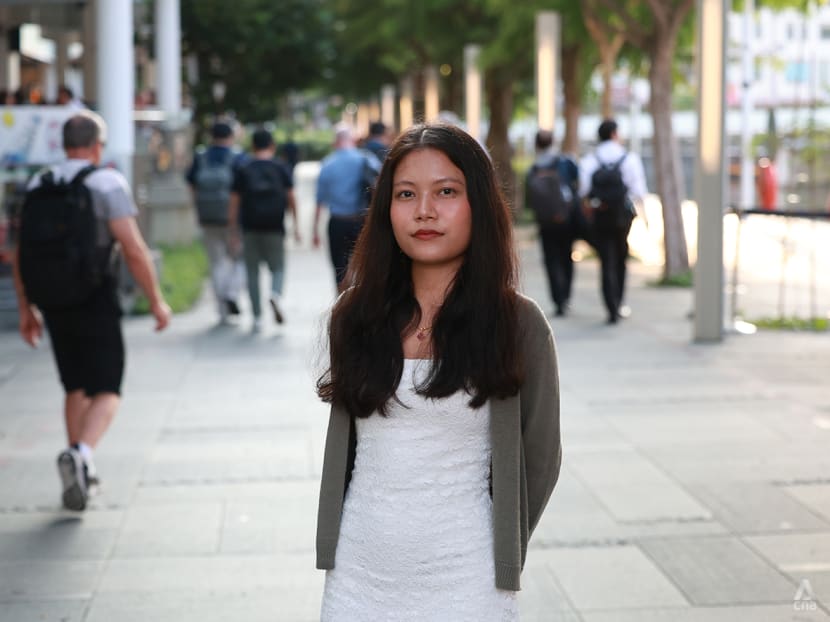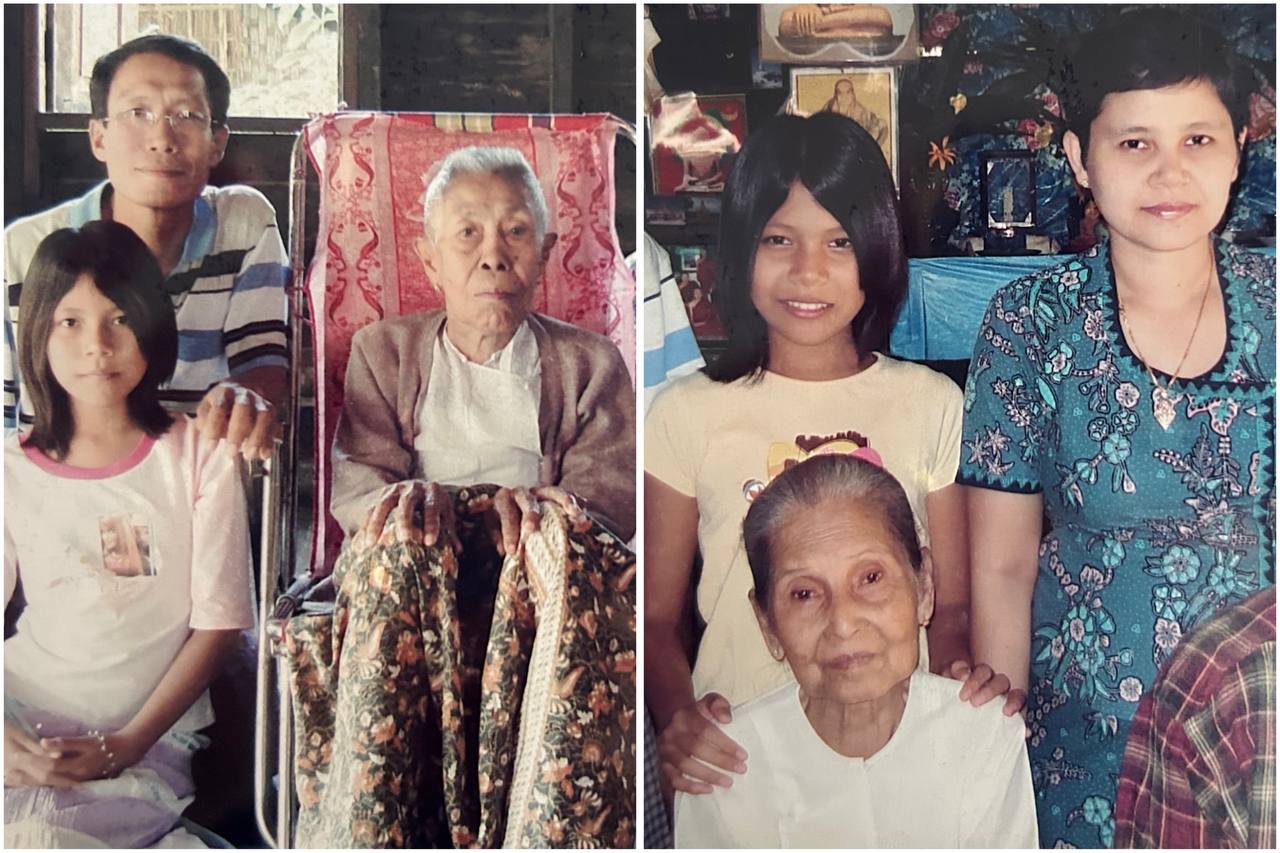- Joined
- Apr 14, 2011
- Messages
- 17,878
- Points
- 113
Growing up, I felt too Burmese to be Singaporean, but too Singaporean to be Burmese
As an immigrant, Voices writer Yanant Aung has always felt trapped between two worlds. Here's how she learnt to embrace both sides of her identity and gained a new understanding of "home".

At the age of eight, Ms Yanant Aung (pictured) and her family left their home in Yangon, Myanmar to come to Singapore for her education. (Photo: CNA/Raj Nadarajan)
Nine words, spoken by my father during a phone call in late 2006, reshaped my whole life.
"Thamee (daughter in Burmese), would you like to come and study here?"
So we packed up our home in Yangon, Myanmar, and in May 2007, we set foot on Singaporean soil. I was eight years old.
My father always said it was my education that brought our family here. Yet, as I grew older, I became more aware of a silent struggle within me.
I felt trapped between two worlds. The tug-of-war between integrating into Singaporean society and honouring the traditions that my parents fiercely preserved weighed heavily on me.
Over time, what started as a cultural balancing act then became a core part of my identity.
LEARNING TO FIT IN
Despite my fears, I was excited to learn about my new environment.I adjusted pretty quickly, from starting primary school to learning Chinese and picking up Singlish. Local habits became second nature (chope a table before you order food, obviously), and I even earned a Chinese name from my then-teacher.
By the age of 10, I was speaking both English and Mandarin fluently, my cadence and accent indistinguishable from most Singaporeans. I wasn’t just fitting into Singaporean culture. I was thriving.
My parents, however, ensured I stayed connected to my roots, enrolling me in Burmese embassy exams until Grade 5. I had to keep studying Burmese – but also science, mathematics, history and geography, all in Burmese.
I took pride in my Burmese fluency. For me, it was a hugely important part of my identity as a first-generation immigrant.
But my parents and I were aware that academic pressures would ramp up during secondary school and junior college. Juggling two different education systems in two different languages was already tricky – it would soon become far too much.
With my parents’ consent, I chose to let the Burmese embassy lessons go before starting secondary school.
Eventually, Burmese slipped from my limited grasp – slowly and, truth be told, painfully.
Today, I can still salvage scraps of my speaking and reading skills, but the lack of practice has led me to lose my writing abilities.
Related:
A VISITOR IN A LIFE NO LONGER MINE
My school holidays were often spent visiting Myanmar.I loved Myanmar – the food, the memories, the community – but with each visit, I found myself missing Singapore’s comforts a tad more: Reliable electricity, easy access to everything, and a sense of safety.
In Myanmar, I started to feel almost too Singaporean – a visitor in a life that was no longer mine.
Yet, back in Singapore, where people struggled to pronounce my name correctly, I was constantly reminded of how Burmese I still was.
Seeking to reconcile the growing gaps in my identity, I desperately looked for Burmese friends.
While at university, I joined the Burmese Cultural Club and was lucky enough to form genuine connections with like-minded people who shared both my heritage and my hopes for Myanmar's future.
Identity conflict is always particularly complex for immigrants, but no two people have the same experience of it.
What we feel and how strongly we feel it is shaped by many things: The timing of our uprooting, the people who accompanied us or those we left behind, and so on.
Some of my Burmese friends moved to Singapore later in life, closer to adulthood. For them, ties to home remain much stronger. Their families are still in Myanmar, and their core sense of identity and belonging remains intact, less fractured by cultural clashes.
One close friend who came to Singapore for studies at a university never saw the island as more than a temporary stop. Unlike me, he spent his time here alone, surrounded by strangers.
Despite the security and opportunities that Singapore offers, he could never ease the loneliness or the emotional toll of starting over in a place that never felt like home.
The sense of belonging that other Burmese friends seemed to find here always eluded him. His connections are scattered worldwide; he’s drawn to a more global life.
Related:
A LIFE I’LL NEVER KNOW
In the midst of the COVID-19 pandemic and political instability back in Myanmar, I lost both my grandmothers.In Burmese culture, filial piety is sacred – this duty to honour my elders’ sacrifices is something I carry with me daily.
And yet, those moments of loss felt somewhat stunted, because I hadn’t been as close to them as I should have been.
Limited by my father’s work demands, our time together had been condensed into a few short days each year, split between their hometowns. Our relationships were largely reduced to brief phone calls and old photographs, “how are you” exchanges, as well as polite but detached questions about school and about their health and the weather.
The distance between our lives was unmistakable – we rarely shared moments of enthusiastic mutual understanding or connection. Years of separation had eroded whatever bonds we might have once had.

My parents, who had sacrificed everything for their child’s future, were denied the chance to say goodbye to their parents. They mourned alone in Singapore, while in Myanmar, my aunts and uncles shared their grief together.
There's a unique kind of guilt that immigrants all experience, one rooted in never being able to fully repay our parents for the sacrifices they had made.
Even now, whenever I see that friends have close relationships with their grandparents, I still feel a pang of jealousy. It sometimes leaves me longing for a life I never truly knew – not necessarily a better or worse life, just a different one.
Related:
WHAT IS “HOME”?
Being a third-culture kid is rarely easy.Traditions blur, cultures blend and we do what we have to in order to adapt to new environments.
Over time, the things that once formed the foundations of our lives and identities shift or are replaced entirely, and we have to continually make sense of that for ourselves.
Now, we’re seeing people once again leaving Myanmar in droves amid political turmoil. Even as the home I once knew continues to fade, the idea of "home" itself feels even more elusive.
Yet, many Burmese here hold on to the hope of returning one day to a place transformed for the better, where we and the people we love can be safe.
Until then, we contribute however we can – raising awareness and supporting humanitarian causes through donations and fundraising, believing that we can and will help rebuild from afar.
But now, as an adult, I’m starting to understand that for myself and many like me, home is no longer tied to a single place or physical location.
Home is found in the people we meet, the relationships we nurture, and the communities we build. Wherever we go in life, home can be built and found, over and over again.
I’m still learning to fully embrace both sides of who I am.
I’m as Singaporean as the next person – I grumble about the heat and crowds, relish long weekends, eagerly await monthly shopping deals, and love to unwind with a plate of chicken rice, char kway teow, or a bowl of potently spicy mala.
At work, I slip easily between Queen’s English and Singlish. With friends, we blend English, Mandarin and Burmese all at once.
At home, I speak Burmese with my family, savour Mum’s hometown cooking, stock up on Burmese groceries from Peninsula Plaza, and follow updates on Myanmar and our community online.
I now know that defining my self-identity might not ever be a destination that I arrive at, but rather a lifelong journey – but at least I’m confident that I’m not “too much” or “too little” of being Burmese or Singaporean.
I am, quite simply, both.
Yanant Aung works in communications and enjoys writing about societal issues close to her heart.



